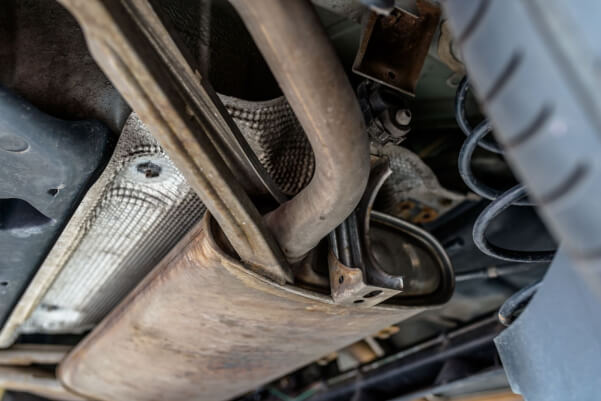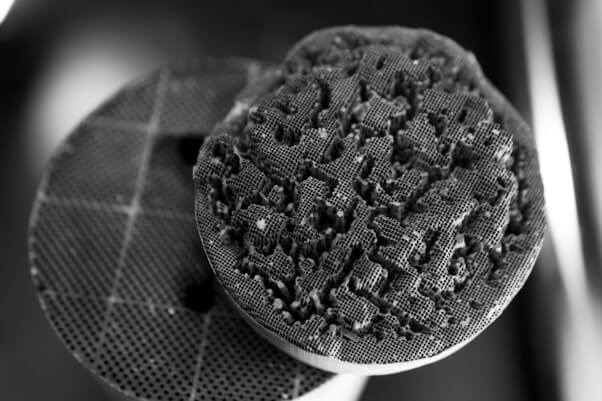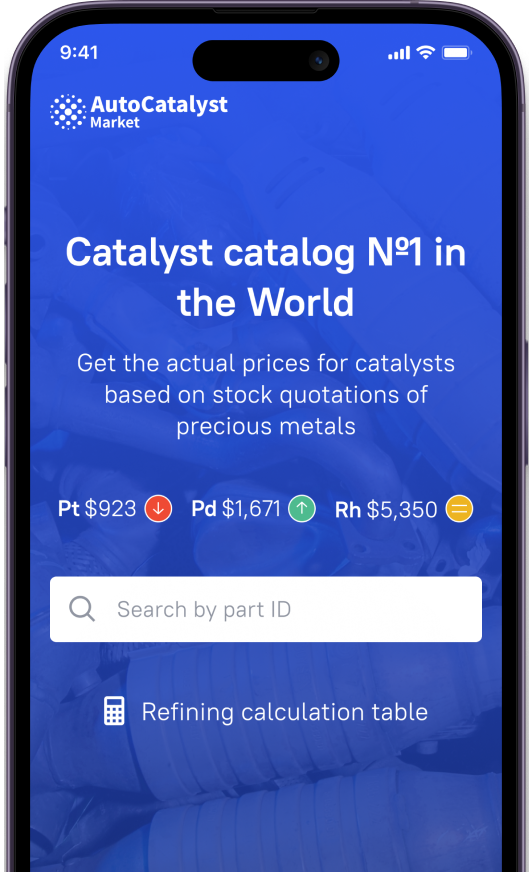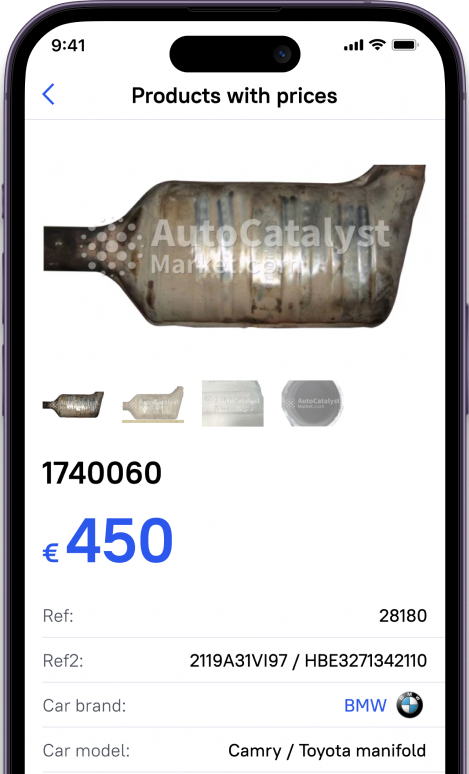- Selling points
- Type and price identification
- How to find buyers near me and how it works
- Recycling near me and how it works
- The most popular brands of used catalytic converters
- The most expensive catalytic converters
- Conclusion
Amidst the ever-expanding automotive landscape, with cars proliferating on our roadways, the paramount concern of safeguarding our environment against the deleterious emissions of exhaust gases rises to the fore. It was during the mid-1970s that catalytic converters (catalysts) made their debut, swiftly progressing into a ubiquitous feature of production. In the contemporary milieu, the degree of exhaust gas purification is meticulously attuned to harmonize with Euro standards, obliging every vehicle to incorporate this vital component. Functioning as a consumable, the catalytic converter's lifespan is intricately entwined with the car's mileage, a span typically ranging between 100,000 to 150,000 kilometers.
The catalytic converter's accelerated depreciation can be ascribed to the utilization of subpar fuel and the vehicle's exposure to taxing operating conditions. So, what course of action does one pursue with a used catalyst? Repairs prove to be an exercise in futility, necessitating an alternative avenue. Catalytic recycling in Thailand surfaces as the definitive recourse, as these worn cat converters continue to conceal cost. Enthusiastic buyer companies are actively immersed in this realm, readily discernible through the AutoCatalystMarket website which works in both ways for selling and buying used catalysts in your region. This platform not only serves as a roadmap for demystifying the intricacies of how to buy or sell a catalyst but also as a wellspring of understanding the determinants governing its pricing. Let's dig deeper and uncover the inherent cost that beckons within the aftermarket for catalysts in Thailand.
Selling points
Nestled in the vicinity of the exhaust manifold, the catalytic converter assumes its crucial role. Concealed beneath its shell are intricate ceramic honeycomb cells, each adorned with a catalytic layer. As exhaust courses through this converter, a remarkable metamorphosis unfolds, with heat and redox reactions transmuting it into benign substances, all under the watchful eye of precious elements. The catalytic layer predominantly incorporates members of the platinum group, namely Platinum, Palladium, and Rhodium. These precious metals are the linchpin for the recycling process, unlocking the potential for selling the worn cat converter, converting it into valuable scrap, and ultimately harmonizing with the rates on the precious metals exchange.
Type and price identification
In your endeavor to sell a previously-owned catalytic converter, the essential initial steps encompass proper identification and a comprehensive grasp of its intrinsic cost. For precise identification, you can rely on the AutoCatalystMarket website, which offers various methods: catalog exploration, photo-based recognition, or the simple input of the unit's serial number into the search bar. Furthermore, within the Buyers section of the AutoCatalystMarket website, you can create a listing for your used catalytic converter, attracting potential buyers. Our database is meticulously updated, ensuring you stay informed about the latest catalytic converter prices. Let's embark on a detailed exploration of each of these steps, optimizing the site's functionality.
How to find buyers near me and how it works
If you're in search of catalytic converter buyers nearby, AutoCatalystMarket is the go-to destination. Simply access the Buyers section and pinpoint your region, with a specific emphasis on Thailand. These buyers extend an array of terms and conditions, covering both catalytic converter and the unit as a whole, honeycomb included. They accommodate both B2B and B2C interactions. The company takes charge of procuring your catalytic converter and executing all essential recycling procedures, concluding with an equitable offer aligned with your selected conditions.
Recycling near me and how it works
The intricate process of catalytic converter recycling involves a series of vital procedures. To commence this journey, ceramic honeycombs are carefully extricated from their protective shells. Following this, they undergo precise grinding, culminating in the selection of a representative sample, meticulously compressed into a compact tablet for subsequent analysis. The linchpin of this analysis lies in the application of a spectral analyzer, enabling an XRF analysis that divulges the precise quantitative composition of the invaluable metals Platinum, Palladium, and Rhodium within the sample. This analysis paves the way for determining the price per kilogram of material, laying the groundwork for the subsequent refining phase.
The pivotal refining phase becomes indispensable in extracting these precious metals from the raw material, involving treatment within plasma furnaces and alkalization. This scrupulous refining endeavor yields a pure, unadulterated product, poised for recycling to craft new catalysts and a diverse range of other practical items. Notably, the dynamic nature of the precious metal exchange exerts its sway on the final cost, with pricing intricately connected to prevailing market quotations.
Thanks to our dedicated platform, AutoCatalystMarket, the labyrinthine realm of catalytic converter recycling becomes more accessible when it comes to realization, with the buyer assuming full responsibility for the recycling process. On our user-friendly website, you can effortlessly access pricing insights customized to your catalytic converter's specific configuration. For a deeper exploration of the intricate components, follow this link to delve into a more comprehensive trove of information.
The most popular brands of used catalytic converters
An extensive array of Car Brands coexists with a multitude of catalyst manufacturers. Many automotive giants collaborate with third-party enterprises dedicated to catalyst production. As a result, pricing can exhibit variations contingent on your converter's type and the manufacturer overseeing its production. Catalyst varieties align with the engine type and the fuel it utilizes:
- Gasoline
- Diesel
- Dual
The most expensive catalytic converters
There are regular and premium catalytic converters and premium ones are the most expensive. Such models as Ferrari, Lamborgini, and Mustang are of a premium class and contain the most valuable catalysts according to the manufacturer.
To decipher the classification of your device, delve into the Car Brands section. This informative resource unveils the cost of your catalytic converter. Leveraging this comprehensive scrap catalytic converter price list, you can gauge the worth of your catalytic converter and assess its current market demand.
Conclusion
Effectively managing the disposal of your used catalytic converters (catalysts) delivers a dual benefit: preserving the environment and safeguarding your financial resources. Hidden within these devices are valuable treasures, encapsulating Precious metals like Platinum, Palladium, and Rhodium within a ceramic honeycomb matrix. The extraction of this pure material mandates a comprehensive catalytic recycling process.
Within Thailand, our AutoCatalystMarket website provides a seamless solution, connecting you with a suitable buyer. Our platform caters to both B2B and B2C markets, offering a diverse range of opportunities. Additionally, you can promptly access the current market price for your catalytic converter and compare it with others. Our extensive database houses a wealth of information encompassing a myriad of catalytic converter types.
AutoCatalystMarket emerges as an intuitive tool, enabling you to unveil the cost of your used catalytic converter and explore selling avenues, all from the comfort of your home.









































